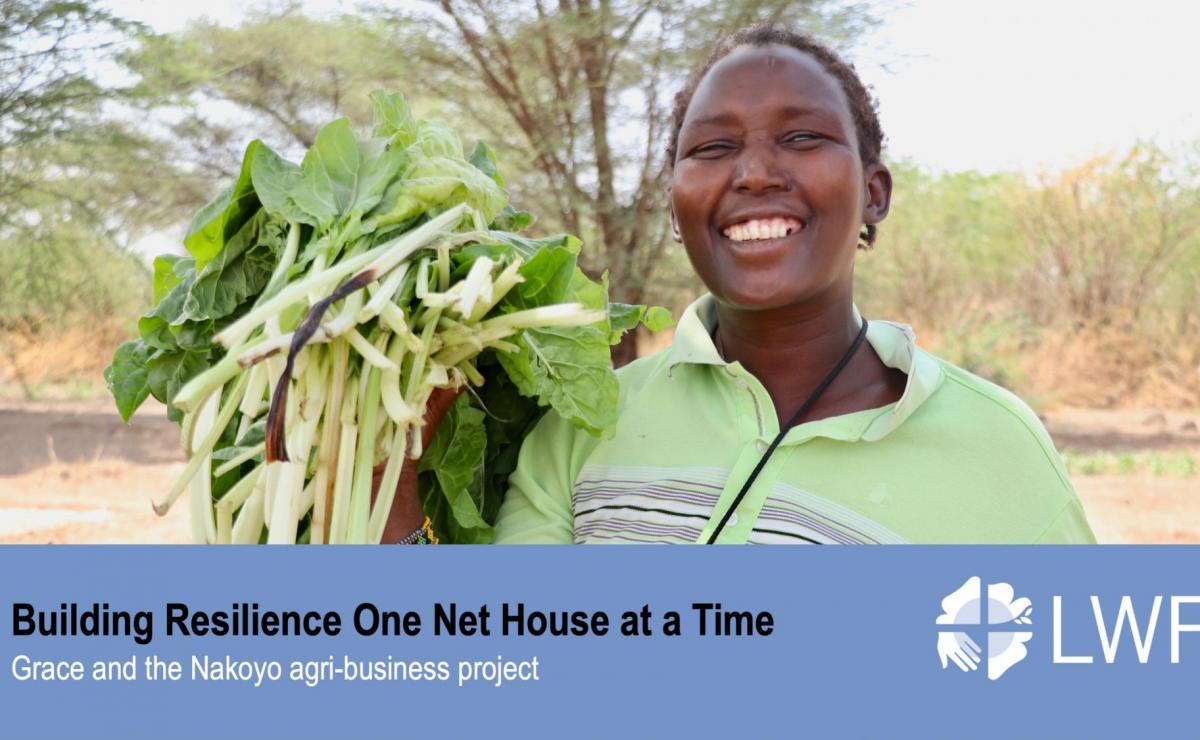ONE NET HOUSE AT A TIME: Empowering pastoralist communities in North West Kenya.

"The net house is my everything. I get my food from here, school fees for my children and save for future emergencies," said Grace, a mother of nine and a member of the Nakoyo net house project.
Turkana County is home to over 900,000 people, and 48% of the population comprises of women and girls. Because of its aridity, most indigenous Turkana people are nomadic pastoralists and mainly rely on livestock.
Despite the community adaptation to the comimetic conditions in the region, the impact of climate change is challenging the traditional coping mechanisms.
Prolonged droughts and worsened food insecurities make it difficult for the pastoralist community to fend for their livestock's the primary source of livelihood. As a result, women and children are the most vulnerable to food insecurities and access to clean water.
LWF’s support
For over ten years, the Lutheran World Federation, LWF has supported several projects directed towards addressing the need to improve the quality of life for the pastoral communities in Turkana West Sub County.
In 2020 LWF, with the support of Dan Church Aid (DCA), implemented a 12-month project to improve access to clean and safe water for domestic, agriculture and livestock use in Turkana West Sub County.
We used to spend the whole day in search of water.
LWF installed a solar-powered water pump and a 10M3 (10,000 litres) plastic water tank in Nakoyo to supply 496 households with clean and safe drinking water. Water pipelines and tap stands were erected around the villages to support open-field crop production.
The villagers of Nakoyo elected a committee to oversee the water system's operations. They were also trained on resource management and mobilisation.
"Before, we used to wake up very early in the morning to go in search of drinking water. It would take us a whole day to find a water spot,' says Grace. "But once LWF connected the water pipes to our village, we were able to spend more time at home and tend to our livestock."
In addition to the provision of water, LWF supported the community in Nakoyo with a highly efficient crop production net-house technology. The objective of the net-house was geared towards intensive production of high-value crops that will enable them to generate a sustainable form of income.
The 240m2 net house established was fully equipped with a drip irrigation system that will allow crop production in a protected environment.
"In Turkana County, the rate of food poverty is more than 70%. We saw the importance of introducing projects on Climate Smart Farming such as the Nakoyo Project to ensure continued food production throughout the year irrespective of the weather conditions," said Zabdi Chumba, the livelihood officer for LWF in Kakuma. "With one net house at a time, we are building the self-reliance of the pastoralists communities in Turkana West sub-county."
Grace is among the 86 individuals that are benefiting from the Climate-smart agriculture intervention. Together they were trained on hands-on agricultural skills, including; crop production, soil and water conservation, disease and pests' control, drip irrigation systems operation, scheduling and maintenance, as well as business and marketing skills.
The group were provided with farm equipment and tools to improve their production capacity of vegetable production.
The group established spinach as their first vegetable crop, and so far, they have cumulatively sold 819.7 kg of vegetables worth kshs—81,970 in the ongoing season. The profit collected is pooled into a revolving fund and shared among the group members to cater to their basic household needs and inputs for the subsequent season.
Every morning Grace and her team tend to the farm. They do not need to travel far in search of water or work.
"I fully depend on the farm and the net house for everything," says Grace." I can even afford to buy things that I could not afford before, like new shoes and clothes,"
Additionally, to Improve income flow through livestock farming, a participatory Disease Surveillance exercise (PDS) was conducted in 6 villages of Turkana North Sub-County in partnership with the Ministry of Health and the County government of Turkana.
16,998 livestock were vaccinated against zoonotic diseases, and over 100 people were tested and treated for malaria, respiratory tract infections, pneumonia and other skin diseases.
Additional reporting by Zabdi Chumba

